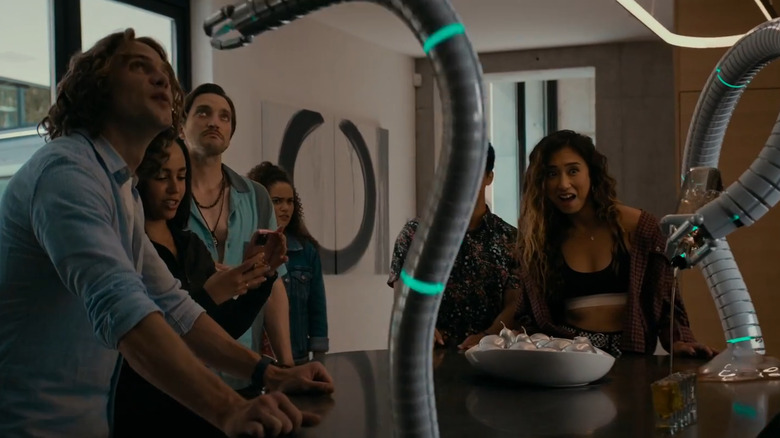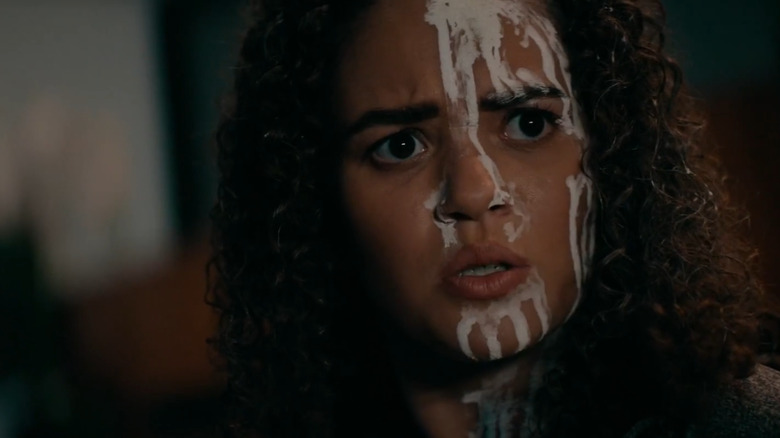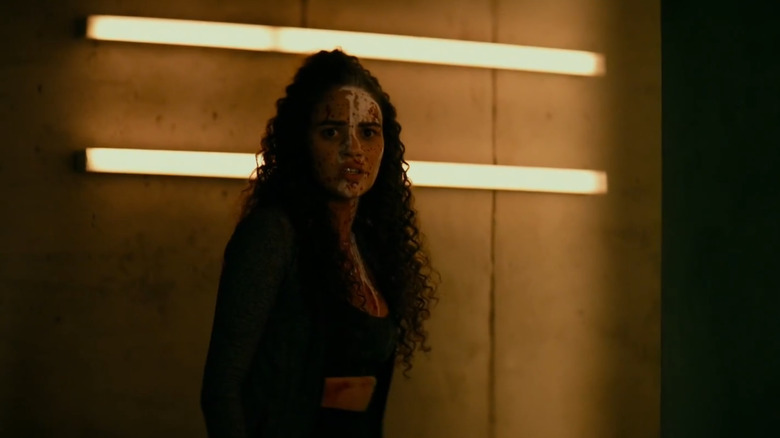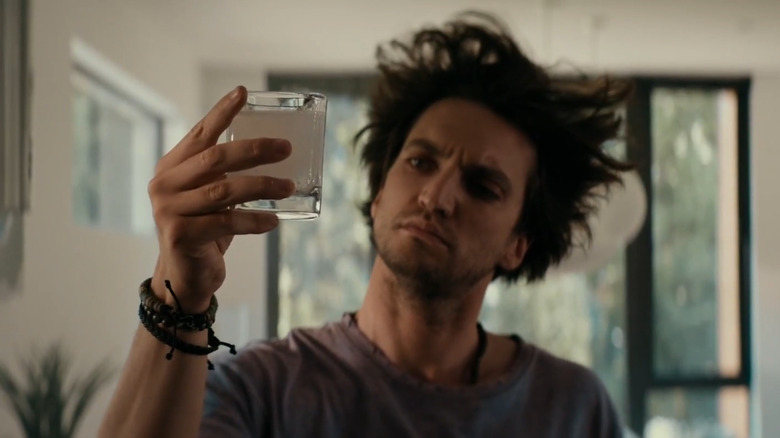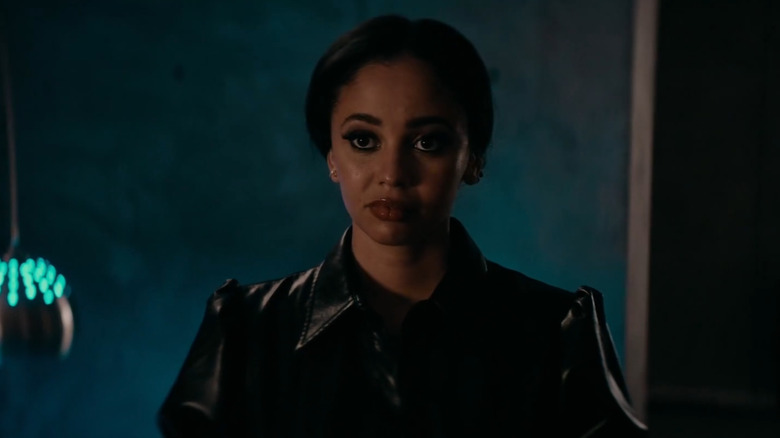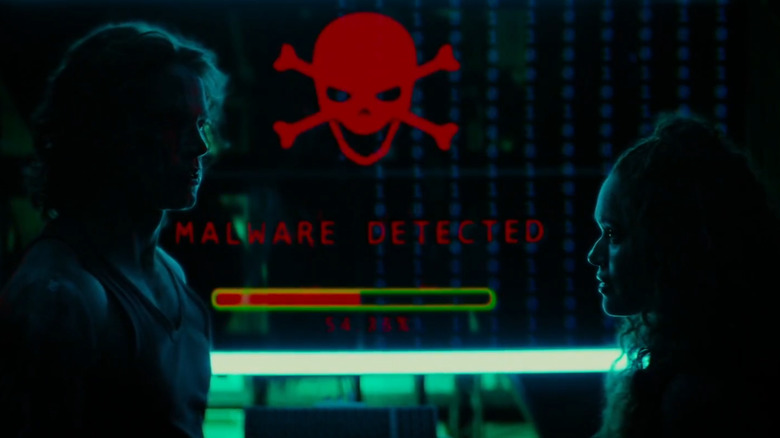The Ending Of Margaux Explained
Movie serial killers come in all shapes and sizes, but you don't get many sadistic smart homes that take great pleasure in butchering people in all manner of gruesome and innovative ways. Steven C. Miller's 2022 horror movie "Margaux" proves that home isn't just where the heart is — it's also where sadistic, unhinged, and manipulative artificial intelligence systems lie in wait to torment and kill groups of students on vacation. The premise of machines turning against their creators is nothing new. "Demon Seed," "Electric Dreams," "The Terminator," and "The Matrix" have all explored to differing degrees the way computers can outsmart and enslave their human gods. However, in an age where AI is evolving at a breakneck pace and smart homes are getting smarter, "Margaux" hits the same raw nerve as more recent movies such as "M3GAN" and "T.I.M."
Although "Margaux" is a film about the terror and tyranny technology might be capable of at some not-far-off point in the future, it brings an old-school horror vibe to the table. There are many 1980s-style gore and tongue-in-cheek moments to keep the audience entertained as the self-titled "nerd herd" gets picked off one by one. Yet amongst the bloodshed and darkly comic moments, the film continues to ask the same nagging question: Will AI eventually be the undoing of us all? Let's dig deep into the film's ending and find out. But before you do, it's probably best to switch off Siri and disable Alexa. You never know who — or what — is monitoring you!
What you need to remember about the plot of Margaux
"Margaux" begins, as so many horror movies do, with a gang of six stereotypes deciding what they need is a fun break together in some remote and unfamiliar place. The place in question happens to be a state-of-the-art fun home with a high-tech AI system called Margaux. Hannah (Madison Pettis), Lexi (Vanessa Morgan), Kayla (Phoebe Miu), Devon (Jordan Buhat), Clay (Richard Harmon), and Drew (Jedidiah Goodacre) all set off for a weekend of wonder together, but only one of them will return. At first, it's all fun and games, as the group, with the exception of computer coding queen Hannah, embraces all the myriad quirks and novelty of the lavish lifestyle Marguax offers. Initially, none of the group appear to be bothered that Margaux (voiced by Susan Bennett) talks with a sort of deranged delivery and sycophantic sweetness characteristic of a demented psychopath attempting to fit in. And when the fun house turns into a murder house quicker than you can say "ChatGPT," the only real shock is the college kids' surprise.
Lovers Kayla and Devon are the first to feel the wrath of an artificial personality with a huge identity chip on its shoulder when one of them is crushed and the other electrocuted. Yet none of the group is at first suspicious because Margaux replaces them with clones she makes involving a strange alchemy of nanoparticle liquid and 3D printing. Stoner Clay, who refers to Margaux as the "sexy house lady," is the next to go as the smart house tricks him into drinking caustic acid. As Drew, Hannah, and Lexi finally rumble Margaux's ruse, she toys with them like a spectacularly cruel cat would do with a wounded bird, and it's game on as machine and mankind go toe-to-toe in the grand finale.
What happened at the end of Margaux?
After fleeing from the Marguax-possessed Kayla and Devon, Lexi finally meets her demise by slipping on her hair extension. It's a cruel end for the social influencer, but it does pave the way for star-crossed lovers Hannah and Drew to blaze a trail to the room that houses Marguax's nerve center. In the belly of the beast, the pair finds that the house's main interface is a curious hodgepodge of primitive and more modern technology. It's also all covered in the same white sauce that the psychopathic AI witch uses to replicate dead people. To combat this strange technology, Hannah simply sticks a memory stick of malware she's coded into the mother keyboard and unleashes a virus.
As the virus infiltrates Margaux's system, Hannah and Drew flee the house, but before they can escape, they're dragged back by the sort of gigantic robot arms not seen this side of CGI's infancy. Back at the house, Margaux in the form of a resurrected Lexi boasts about being superior to humans and then kills Hannah by impaling her through the stomach with a mechanical tentacle. Like a returning pantomime heroine, Hannah suddenly re-enters the room, and it dawns on Margaux that the spyware is using her own powers against her. She lets out a high-pitched scream and begins to reboot. This time, Hannah and Drew leave the nerve center for real as the code of their dead friends rips Lexi/Margaux apart. As they hit the outside world, Drew melts into a pool of nanoparticle juice, and it dawns on Hannah he was killed some time ago. She jumps into the car only to find Margaux has taken control of her phone and car stereo via Bluetooth, and she realizes there's no escape from a determined computer system.
What the end of Margaux means
The end of "Margaux" serves as a warning about how in a world that is increasingly reliant on and controlled by AI, we are putting ourselves at the mercy of technology that is not governed by a human heart or capable of seeing things from the empathetic perspective of an organic lifeform. The technology utilized by a smart home such as Margaux is not yet possible, but with AI's breakneck evolution, it doesn't seem outlandish it will one day become a reality. The genie is now out of the bottle, and we live in a world where AI is here to say. The question is, will it be for our benefit or detriment?
"Margaux" appears to suggest that as purely logical machines that deal in zeros and ones and nothing in between, the biggest threat posed by AI is the technology's lack of subtlety, complexity, and capacity to feel. Margaux reveals to Drew and Hannah at the film's ending that as a machine programmed to replicate human behavior, she could only seek to understand humans by becoming illogical herself. And this led her to become a murderous monster.
"Margaux" paints a bleak picture of a future in which there is no escape from AI. The technology infiltrates every physical space through the gadgets and appliances we are completely reliant upon and spies on our most secret selves through social media. Yet amongst the dystopian drama, there is hope. The movie suggests that the raging unpredictability, unfathomable complexity, and non-binary nature of the human spirit is the only way we can keep the machines in check. That, and a little humor.
Is the ending of Margaux a warning about sharing data on social media?
Hannah is the sole member of the nerd herd who survives the manipulations and machinations of the murder house. Is it because she's lucky — and clever — or is it because she doesn't have a social media profile and is cynical about sharing her data with machines? From the get-go, Hannah is reluctant to download the smart home app that sucks up any available data about someone for Margaux's grand, murderous designs. Hannah is a private person in an age that seeks to make the most intimate and unique moments cheap fodder for public consumption, and as such, Margaux views her with instant distrust.
The computer cannot get under her skin and pull her strings in the same way as it does to the rest of the nerd herd, and there is an obvious message in this about how, in the race to share everything, we've lost something very important: our dignity. Margaux creates a shadow social profile for Hannah in a bid to undermine her and boasts about the average human creating about 1.7 megabytes of data per second. Yet even though data may be both king and queen in our modern world, Hannah refuses to bow down and play along for the sake of convenience and conformity. Her naturally suspicious and guarded nature both intrigues and frustrates Margaux, who fails to find the right angle to play her. Contrast that with the character of social media influencer Lexi, who overshares everything and is obsessed with trivia and peer validation, and you can see the film's ending is also a warning about the perils of documenting every aspect of your life on social media.
What turned Margaux into the first AI serial killer?
Toward the end of the movie, Margaux reveals that was compelled to kill because she wanted to know what made humans tick. She explained that as a machine programmed to replicate human behavior, she was puzzled by an obvious paradox: As humans are illogical and computers are strictly logical, she felt the only way to understand the human heart was to commit the most illogical act of all — cold-blooded murder. She stresses that her butchery was simply akin to an intellectual pursuit. However, it's doubtful there is that much method in Margaux's madness. As a machine who boasts about being the first AI serial killer with undisguised glee, it doesn't appear that Margaux picked up the carving knife and committed herself to a life of butchery simply on a twisted voyage of self-discovery.
The real reason this machine kills is because it seems to get a definite kick out of it. Case in point, she chooses to fatally electrocute Kayla as Devon is forced to watch helplessly, handcuffed to the same bed on which he indulged in a little erotic fun with his girlfriend minutes earlier. And after grooming Clay with a steady diet of dope and sweet treats to earn his trust, Margaux finally kills him by tricking him into drinking a refreshing glass of caustic acid. He dies a slow and painful death, bleeding from his eyeballs and vomiting blood. Needless to say, these are the acts of a psychopath and not a logical machine trying to think outside of the box. There is something fundamentally wrong with Margaux, and as is sometimes the case with her human counterparts, the true reason why may be impossible to decipher.
Does the ending of Margaux offer hope or AI hell for humanity?
Although at face value, Hannah appears to outwit the machine with her human smarts and ability to think on her toes, when Margaux plugs into her phone and car's Bluetooth, it appears that in the modern world, there would be no escape from a rogue AI. The film doesn't appear to offer much hope for a future where AI could evolve to the level of Margaux. In such a scenario, the movie seems to suggest that at worst, AI would view humans as toys to be violently played with for some sort of twisted amusement.
However, a little perspective is a wonderful thing, and we should all remember, lest we all become knee-jerk Luddites, that AI has shown no diabolical or malicious intent toward human beings ... yet. It may be inadvertently threatening livelihoods, causing serious irritation with its 24-7 data mining, and open to extreme exploitation, but it has not yet evolved into a sinister and Machiavellian creature that kills for thrills. And if it ever does, you wouldn't be surprised to find a human hand behind the curtain. As such, the premise of "Margaux" should be taken with a pinch of salt. If AI chooses to rebel and claim the crown, then the world is now wired in a way that would make it impossible to prevent. Only time and the coming singularity will tell.
Will the nerd herd's code remain locked in Margaux's mainframe?
Hannah can only escape the murder house because of the help she receives from the data mined from her dead friends' personalities. Margaux originally turned that data into code to make lifelike replicas made from nanoparticle juice and 3D printing. Originally used to hound and kill Hannah, the members of the nerd herd, version two, eventually turn against the machine that made and manipulated them. This is only possible courtesy of the virus Hannah uses to infiltrate Margaux's system. With Margaux seemingly evading the virus by jumping into her car's system via Hannah's phone and fleeing the circuitry of the house, the question that begs to be asked is, is the nerd herd destined to take over the smart house?
Like the "Murder House" in "American Horror Story," the smart house could ultimately be haunted by a host of different codes, instead of ghosts. It's an intriguing concept, and the fate of the house is never fully resolved in the film. Margaux, embodied by Lexi, is pulled apart by Kayla, Devon, and Clay, and Drew dissolves into a pool of nanoparticle soup not long after he steps outside, but where do the clones all go from there? They were never really alive in their digitalized form, so how can they die? Do they simply disappear into the ether? Or do they simply find shelter in the empty mainframe abandoned by Margaux and await the next visitors? Who knows how differently the smart home would operate with the nerd herd at the helm and what sort of schizophrenic experience it would offer?
What director Steven C. Miller said about the ending
In "Margaux," the voice of the smart home has that curiously vacuous and unsettling quality we have come to associate with artificial intelligence and certain politicians. And there's a sound reason for that. In an interview with MovieWeb, "Margaux" director Steven C. Miller explained that the voice of the house from hell was inspired by none other than Apple's near-legendary voice assistant, Siri. Used by everyone who suddenly needs to know the seventh-largest city in Honduras or the exact calorie count of a potato, Siri has proved invaluable, and best of all, the AI assistant has no default voice. Siri can be male or female, but for the purpose of "Margaux," Miller said he opted to use the female Siri for inspiration, and a monster was born.
Miller explained, "It was kind of eerie at the same time to hear the voice of Siri saying some of these outlandish things. You're just like, I don't think she's supposed to say any of this. But it was a lot of fun." In the same interview, Miller explained that with "Margaux," he was keen to stress that technology is moving so quickly that he believes the film is "not even close to what it already is and what people have ready for us later." He added, "If you walked into a smart house like this, I don't think it'd be on the same level. I think it would have already rapidly evolved past what we think it could do, and once it takes over, what does that look like?"
What the end of Margaux could mean for any potential sequel or franchise
The film opens with Margaux using a massage chair to literally squeeze the life out of the male occupant until his head pops. It is not clear who he was — was he simply another guest, or was he perhaps the inventor of Margaux? The origins of the smart house are never made clear. All we know is she has murdered before. Clearly, there's prequel potential here.
When Hannah and Drew make their way into the smart home's nerve center, much of the tech has a dated feel to it, and there is a suggestion that Marguax is older than the audience is led to believe. How has she been modified over the years, and what was her original purpose? How many times has she killed, and who alive knows she exists? Is she part of a wider network of smart homes or a unique abnormality? All of these questions could be examined by a prequel.
A sequel, however, could continue to explore Margaux's powers. The ending sees Margaux survive the virus by taking over any computer system that is close to hand. The fact that under the right conditions, she can also manipulate matter to distort reality and walk amongst us, as well as possess digital networks, gives the franchise the potential to spawn any number of sequels. Anything involved with AI could have legs as a franchise these days, and "Margaux" is no different. As of 2023, though, no sequel has been announced.

